Jim Diamond needs no introduction. Since 1996 the wizard proprietor of Detroit’s legendary, now sadly defunct, Ghetto Recorders has put his magic touch on an impressive collection of some of the world’s best records from the garage and real rock n roll scene. Having played bass in the Dirtbombs and having been responsible for curating the raw primal sound of the first two White Stripes albums, Jim was instrumental in another glorious chapter in Detroit’s historic music scene.
Having amassed an esteemed list of clientele, his signature trademark can be heard on some of rock’s most celebrated artists ever to be burned to wax – the Sonics, Andre Williams, the Fleshtones, the Hentchmen, New Bomb Turks, the John Spencer Blues Explosion and countless others.
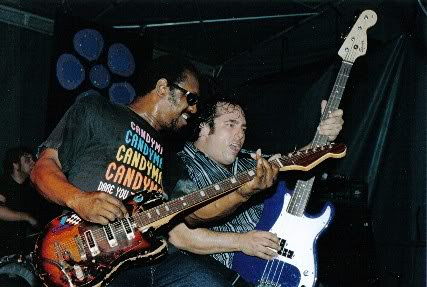
Jim was forced to shut the doors at Ghetto Recorders last year due to what he described as “hipsterfication in the downtown Detroit area when his landlord doubled his rent. A film crew came to Ghetto shortly afterwards to ask him his thoughts about Detroit’s rising trendy, hip ‘creative class’ and Jim wasn’t shy in speaking his mind:
“I said something like ‘Yeah, it’s great. I’m being run out of downtown because of all you creative types,’ ” Diamond said. “You know that cool image about Detroit being a raw, authentic place that I helped create. Well, now I can’t afford it.”
Jim has recently set up a new base abroad in Montpellier, and continues his prolific presence across the scene, working with bands from Cambodia to Cleveland.
In recent years, Diamond has become something of an unofficial in-house label producer and engineer here at Dirty Water Records, putting his imprint on Muck and the Mires, Archie and the Bunkers, Raw Fun and Oh! Gunquit over the last two years.
Muck’s Evan Shore describes what he thinks truly makes up Jim’s sound: “Jim’s magic is his ability to capture the raw energy of a live band. Today’s modern studios are typically not designed to accommodate a live act. They operate more like sterile laboratories where tracks are laid down one at a time to perfection, and where the magical qualities of setting an amplifier’s volume on ‘10’ is strictly forbidden because the buzzing and humming it produces is seen as a flaw rather than a commodity.”
When Jim heard teenage trash sensations, Archie and the Bunkers through the Midwest grapevine, he got in touch with them about recording an album.
“I’m not quite sure who told Jim about us, but when he contacted us about recording and producing our debut album, we were really excited,” said Archies’ drummer Emmett O’Connor. “We were both familiar with his work.“
Cullen O’Connor, Archie’s keyboardist continues, “We hopped in the car, drove for three and a half hours, got to the studio, set up, and the tape was rolling within the hour. Two days and twelve songs later, our first record was done.
“Presto! It was crazy. Instead of breaking us up into different recording booths, we basically played live in one big room. He captured our real sound, and when people see us live, they feel the same energy that is on our album. Jim Diamond is a renowned producer, and it was an honour to have his name on our record.”
Much like his organic and unconventional approach to engineering bands, Jim has a knack for sourcing artists to work with directly through word of mouth circles. Patrice Picard of the Cannibals and Raw Fun, a well-respected and accomplished engineer is his own right, remembers when Jim reached out.
“A couple of months after we started Raw Fun I uploaded a demo online of our first recording ‘Won’t Be Told’,” He said.
“I recorded it live with the band in a rehearsal room and added vocals later in my bedroom. A few weeks later, I was in the process of mixing it when somebody contacted me on Facebook asking if we released the single, as he loved the demo and wanted to help us.
“My first reaction was to reply that I was doing everything myself. When I realised it was Jim Diamond, I nearly fell off my chair.”
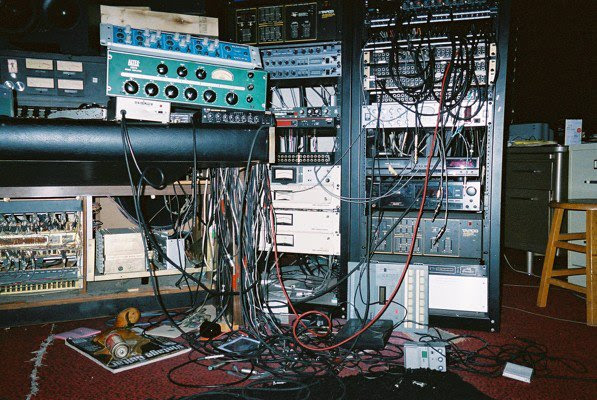
Muck and the Mires worked with Jim on two albums, having admired the records he had produced by bands that they considered ‘contemporaries’.
“They all sounded ferocious and we wanted our next record to sound like that,” Evan Shore said.
“We flew to his old Ghetto Studios recording studio in Detroit to make A Cellarful of Muck and subsequently, ‘Dial M for Muck’.
“When we first entered his studio, it looked more like a pawn shop than a studio. The live room was filled with broken amplifiers and a beat up drum set. The control room was cluttered with even more junk.
“But we quickly learned that Jim has the unique ability to take any old rusty piece of equipment and create any sound that he needs from it. On Dial M for Muck, we did not even wear headphones. We set up close to each other around the drum set and played live.
“This is typically not a recommended studio practice – having all the tracks bleeding into each other, but in doing so, Jim captured the electricity in the air. Try doing that in a modern digital studio!”
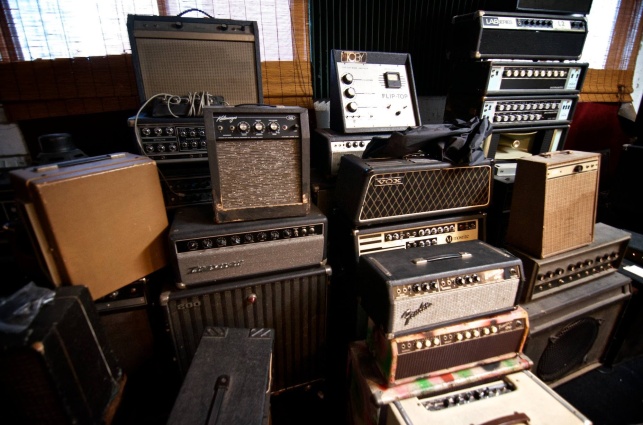
There is no doubt there was something special left behind in the walls at Ghetto Recorders, and ‘the tape doesn’t lie’ as they say. If you’ve heard the new Sonics record, then you’ll know why.
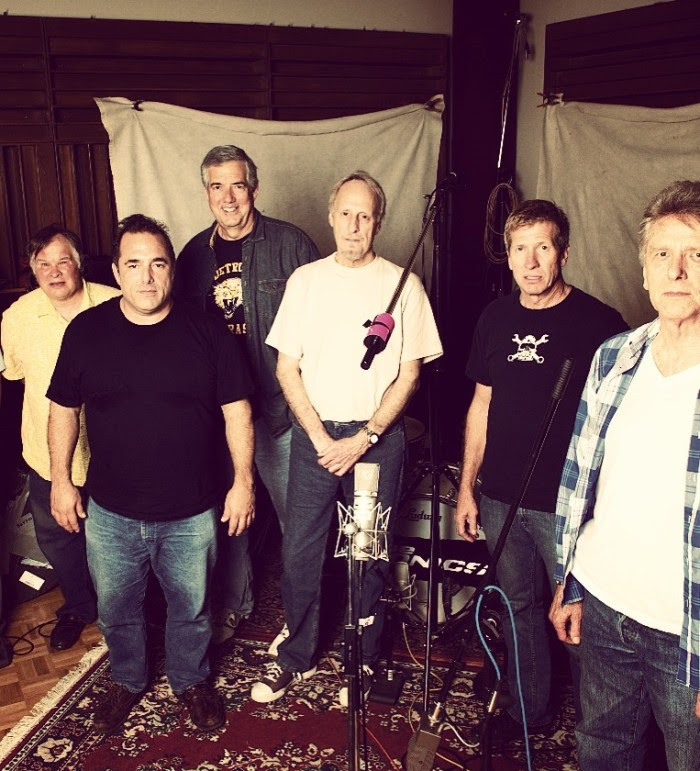 We caught up with Jim in sunny and tranquil southern France to find out more about his forced exile from downtown Detroit and to talk shop.
We caught up with Jim in sunny and tranquil southern France to find out more about his forced exile from downtown Detroit and to talk shop.
Heatwave: So it’s 2016, and not even a year has passed since Ghetto Recorders closed its doors. After 18 years, what’s it like being exiled to France?
Jim: It was pretty crazy. You’re in a place for all those years and then you start planning the big bug out. I had been over in France touring and recording with the Cambodian Space Project in the summer of 2014 and ended up in Montpellier recording a band called the Sonic Angels.
I met a friend of the band and voila, love blossomed. Ahh, the power of music and love. At the beginning of 2015, I wasn’t sure if I would just move to another location in Detroit, but then having someone in France, well, that can influence your decision.
Finally, I said, ‘I’m outta here.’ Why not? You only have one life to live, take a chance! And my landlord wanted me out and the place was literally falling apart. But yeah, moving all of the gear that I had accumulated over all those years, it was a Herculean task, to put it mildly. Physically and psychologically.
Heatwave: What’s the new set up and the studio? Did you bring all the recording equipment and gear over from Detroit? Any new stuff worthy of mentioning?
Jim: As of now, I haven’t set up a new ‘Ghetto’ studio, I’ve been working out of other’s studios. Here in Montpellier there’s a place called Subsonic I’ve been mixing and mastering out of. I have some sessions set up there next month.
I did a record in Toulouse at a studio called Studio La Trappe, I’ve worked at Soup studio in London, and a studio called Yellow Tape in Gent, Belgium, and have some stuff set up at a 24-track place in Barcelona. Then, each time I’m back in Detroit, I do sessions out of a friend’s place in town. I’ve been bringing over select pieces slowly but surely – fuzzboxes, mics, monitors, guitars, etc. We’ll see what the future holds.
Heatwave: You’re working for the band when you’re in the studio. But what do you personally bring to the recording? What part of the records is ‘you’?
Jim: I look at it as we’re working together. Each recording situation is different, but firstly, I like to get appropriate sounds for the band. The mics I choose, mic placement, amps, pedals, all that. When I make a choice it’s not an accident. When I did the Sonics a couple years ago, they commented that I really helped by telling them ‘what not to do.’
I kept making the guitar player turn off his fucking compressor and chorus pedal! I last did a band in Detroit called the Pretty Ghouls. It was all live, through a PA and everything, six songs in an afternoon, then I mixed it. That would be one example. I knew they wanted trash and we got it.
Then the band I did over in Toulouse, I added a lot of ideas, guitar parts, percussion, organ. I love adding parts and playing on other’s records, but I don’t push it, depends on the situation and the band. I’ll always bring some pedals and percussion pieces, maybe a snare drum of mine and make it sound ‘real.’ I like to think, and I’ll always bring ideas and an opinion.
Heatwave: You have a keen ear, to capture that live band’s sound using a variety of methods, did you use more or less the same approach with Muck and Archie and the Bunkers?
Jim: My favourite way to record is probably getting all the basics, guitar, bass, drums all at once, in a room where they can all see each other. I want it to feel like they’re at their rehearsal space. Overdub the vocals and any extra guitars, keyboard, percussion, etc. If they can do it without headphones, even better! So yeah, Archie and Muck started out in the same fashion.
Heatwave: If you can narrow it down to one or two bands that you are most proud of working with, who would they be?
Jim: Wow, that’s a tough one, there have been a lot! I would say doing the Dirtbombs was quite a ride. We’d generally learn a song or two before recording, or even write it on the spot, record the basics then Mick and I would finish up all the rest. It was fun because we did whatever the hell we wanted. There are so many that I have been proud of, there’s no way to narrow it down.
Heatwave: Along with engineering and capturing the live sounds on tape, you also do mastering. How do you utilise digital technology with organic and analogue recording methods?
Jim: Well, sound is sound and a good ear is a good ear. The thing I find in mastering, when you do some digital tweaking, you have to be careful, if you use the wrong thing and overuse it, you get that ‘digital sound’ so you have to watch that, always.
Heatwave: Do you necessarily have to like a band in order to work with them?
Jim: Well, I have done a few bands I’m not super keen on, but I always try to work with people I like. Music means that much to me, I’d hate to fuck around with something I loathe. Ugh.
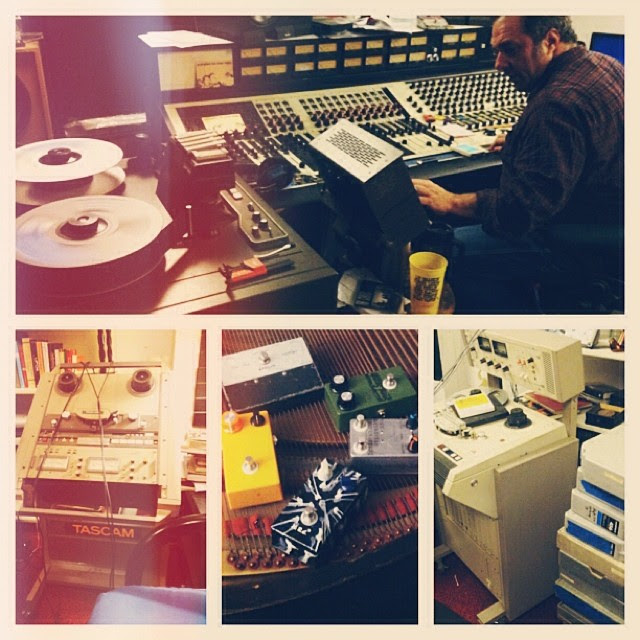
Heatwave: Who was the last ever band to record at Ghetto Recorders?
Jim: That distinction would go to a group of kids called Grand Junction. They just came in, did four songs in an evening, I mixed it and that was that. They were the last band to track there, although I was mixing and mastering right up until the bitter end.
Heatwave: What are your current projects and your plans for the future?
Jim: Right now I’m mixing an Aussie band I like a lot called the Grinding Eyes, out of Melbourne, working on some new songs for the Cambodia Space Project, and a springtime tour and recording project in Phnom Penh is in the works. The mastering is always coming in from the States and elsewhere. I have two bands from Italy coming in, the Cogs and the Devils, and am working on something with a good, young band out of Lyon. Onward and upward!
Heatwave: What was the craziest or most radical experiment you have ever done in the studio with a band? Like placing a drummer on the roof of the studio or locking a vocalist in a bathroom? Or a firearm handy on the mixing desk just in case you needed to keep things in order?
Jim: I do remember having some brass knuckles laying on the desk at one point, but no guns. I remember with a band called the Sights, we threw a computer out of the window, I was on the second floor and we wired up a mic and had the bassist on the first floor holding the mic with the tape machine running then I threw the computer out the window. It wasn’t quite the crash we were looking for, unfortunately.
Another time, Mick Collins and I tossed a drum set down a flight of stairs. I had a mic at the top and a mic at the bottom, for that true stereo effect… .
If there is any silver lining to the unfortunate circumstances of Ghetto Recorders being torn down and revamped into some upscale Craft Beer house or Urban Outfitters, it is that Jim is probably more globally accessible and prolific now more than ever. The new European base will no doubt open up even more opportunities for artists and Jim to carry on collaborating and creating some of the world’s most celebrated sounds maintaining his signature live, raw, and pure trademark for many years to come. We here at Dirty Water Records will certainly continue to remain all ears.
-Matt Hunter
All photos were contributed by Jim





